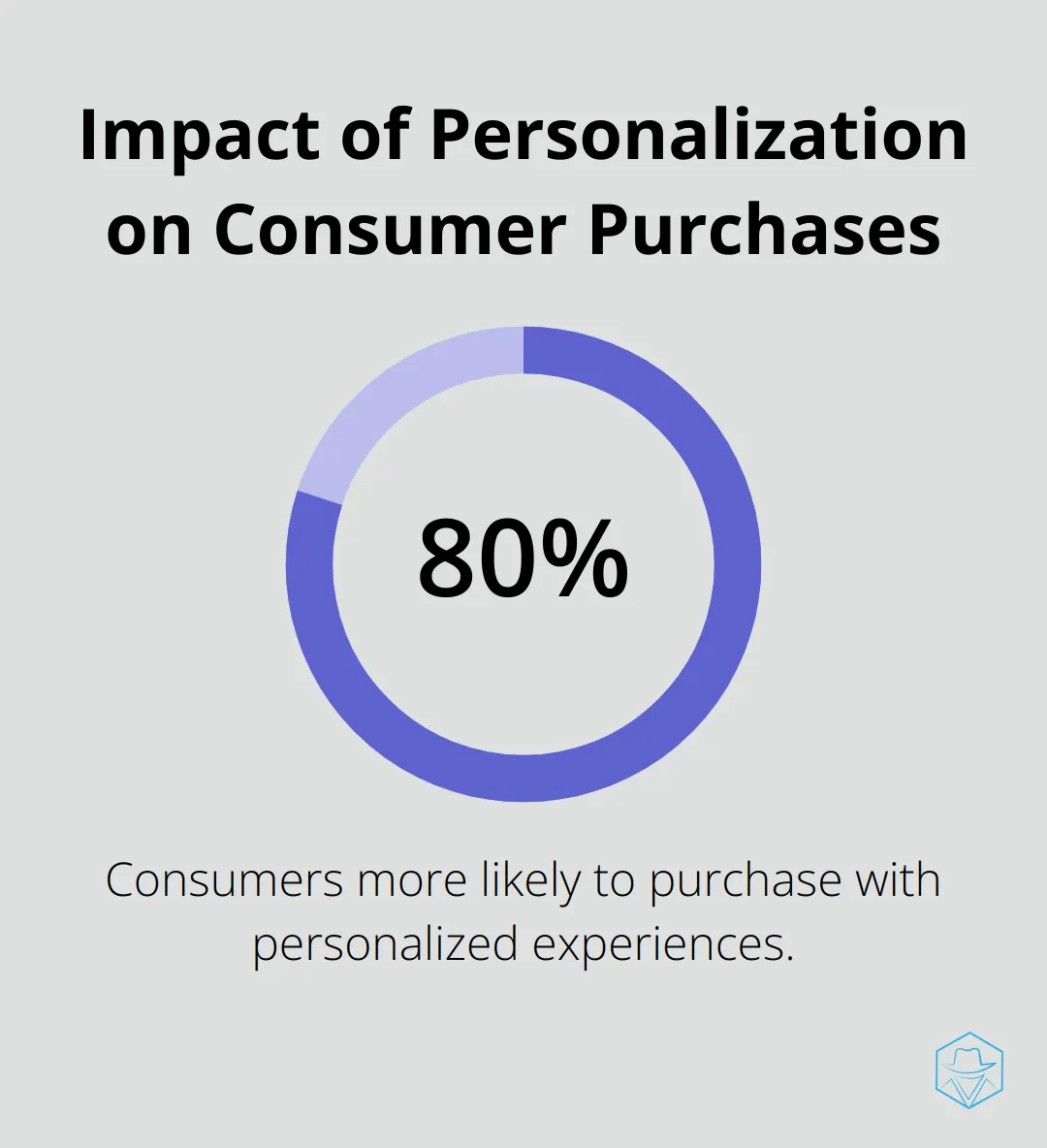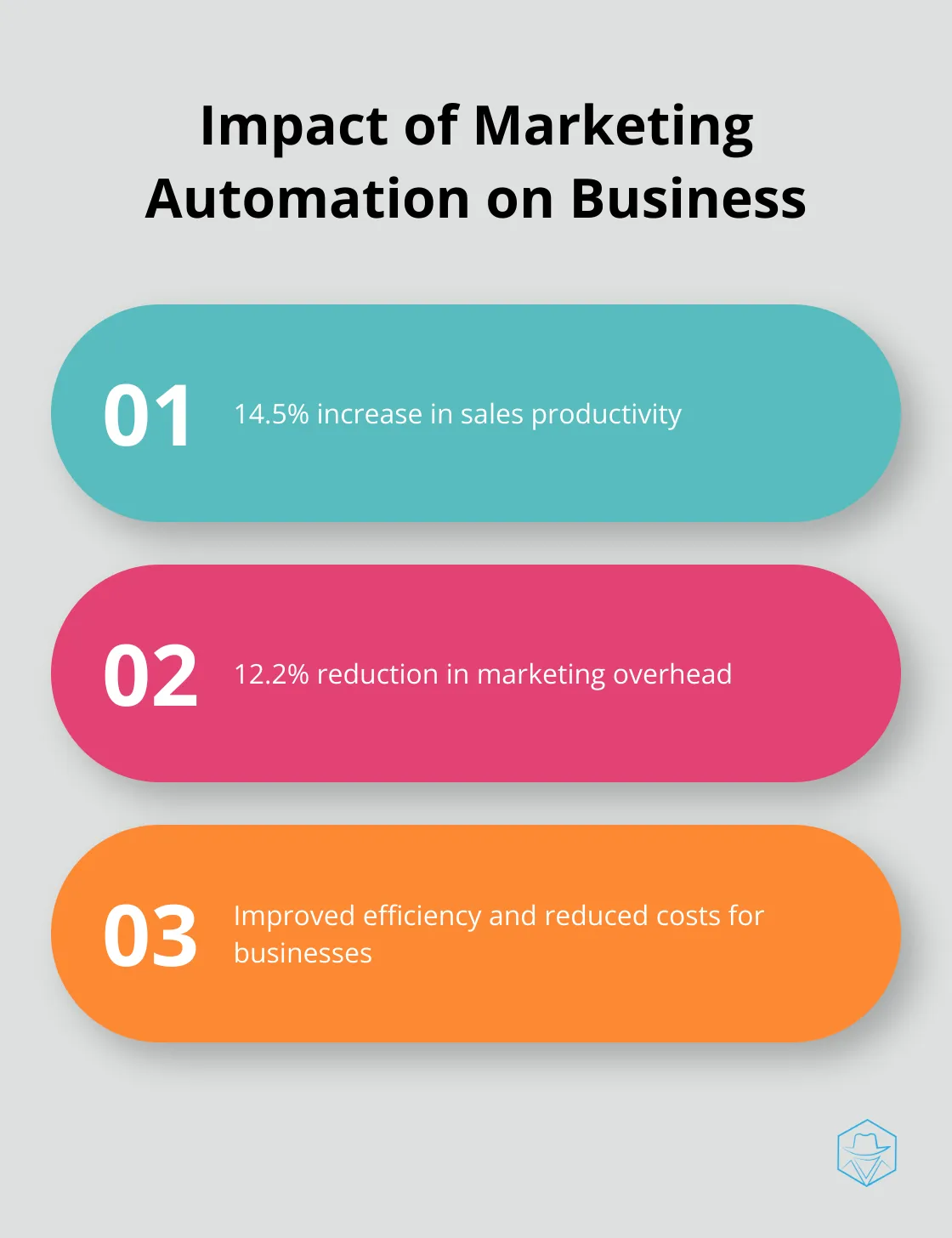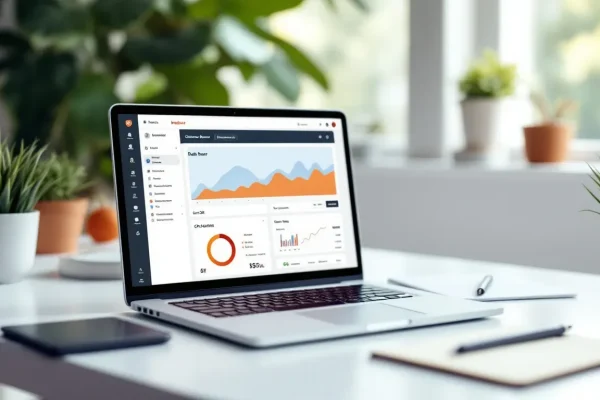Marketing Automation vs CRM: What’s the Difference?

At Drop Cowboy, we often encounter businesses grappling with the choice between marketing automation and CRM systems. These two powerful tools can significantly boost your company’s efficiency and customer relationships.
But what’s the real difference between marketing automation vs CRM? Let’s break down these essential business technologies and help you understand which one might be the best fit for your needs.
What Is Marketing Automation?
Marketing automation revolutionizes how businesses streamline their marketing efforts and boost efficiency. At its core, this technology uses software to automate repetitive marketing tasks, which allows teams to focus on more strategic work.
The Power of Automated Workflows
Marketing automation tools excel at creating and managing complex workflows. These workflows trigger specific actions based on customer behavior. For example, when a potential customer downloads a whitepaper from your website, the system initiates an automated email sequence to nurture that lead. This level of automation ensures that no opportunity slips through the cracks.
Personalization at Scale
One of the most powerful features of marketing automation is its ability to personalize content for large audiences. A study by Epsilon found that 80% of consumers are more likely to make a purchase when brands offer personalized experiences. Marketing automation tools use data from various touchpoints to tailor messages, which makes each customer feel like they receive individual attention.

Measuring and Optimizing Campaigns
Marketing automation platforms come equipped with robust analytics capabilities. These tools allow marketers to track the performance of their campaigns in real-time and make data-driven decisions. A report by Nucleus Research found that marketing automation drives a 14.5% increase in sales productivity and a 12.2% reduction in marketing overhead. This combination of increased efficiency and reduced costs makes marketing automation a valuable asset for businesses of all sizes.

Integration with Communication Platforms
Modern marketing automation tools often integrate with various communication platforms to enhance their capabilities. For instance, some systems (like Drop Cowboy) allow businesses to create highly targeted and personalized ringless voicemail and SMS campaigns. This integration significantly boosts engagement rates and provides a more comprehensive approach to customer outreach.
As we explore the world of marketing automation, it’s important to understand how it differs from another essential business tool: Customer Relationship Management (CRM) systems. Let’s take a closer look at CRM and its unique features in the next section.
What Is CRM?
Customer Relationship Management (CRM) systems form the backbone of modern business operations. These systems serve as a central hub for managing customer interactions and data throughout the entire customer lifecycle.
The Central Hub for Customer Data
CRM systems function as a comprehensive database. They store all customer-related information in one place (contact details, purchase history, communication logs, and social media interactions). This centralization allows businesses to gain a 360-degree view of their customers, which enables more personalized and effective interactions.
Streamlining Sales Processes
CRM software optimizes sales processes. It helps sales teams track leads, manage pipelines, and forecast sales with greater accuracy. Companies using CRM can increase their sales by up to 29% (according to Salesforce), which demonstrates the significant impact these systems can have on revenue generation.
Enhancing Customer Service
CRM systems improve customer service significantly. They provide customer support teams with instant access to customer histories, which enables faster and more personalized problem resolution. A study by Forrester found that 74% of businesses report that CRM software has improved their customer service.

Data-Driven Decision Making
Modern CRM systems include powerful analytics tools. These tools allow businesses to analyze customer data, identify trends, and make data-driven decisions. A CRM can help identify which products are most popular among certain customer segments, which informs targeted marketing campaigns and product development strategies.
Integration with Communication Platforms
CRM systems often integrate with various communication platforms to enhance their capabilities. This integration can dramatically improve customer engagement. For example, businesses that use CRM in conjunction with ringless voicemail and SMS features (like those offered by Drop Cowboy) often report higher customer satisfaction rates and more effective follow-ups.
CRM systems not only improve customer relationships but also boost efficiency, increase sales, and provide valuable insights for strategic decision-making. As we move forward, it’s important to understand how CRM differs from marketing automation. Let’s explore the key differences between these two essential business tools in the next section.
How Do Marketing Automation and CRM Differ?
Marketing automation and CRM systems serve distinct purposes and operate differently, despite both being essential for modern businesses. Understanding these differences helps businesses leverage each tool effectively.
Primary Focus and Objectives
Marketing automation streamlines and automates marketing processes. It nurtures leads, manages campaigns, and tracks customer interactions across multiple channels. For example, when a potential customer signs up for a newsletter, a marketing automation tool triggers a series of personalized emails based on their interests.
CRM systems manage customer relationships throughout the entire lifecycle. They store comprehensive customer data, track sales processes, and facilitate customer service. A sales representative using a CRM can quickly access a customer’s purchase history, preferences, and previous interactions to provide personalized service.
Data Handling and Management
These systems handle data differently. Marketing automation tools collect and analyze data related to marketing campaigns, lead behavior, and engagement metrics. They use this data to segment audiences, personalize content, and optimize marketing strategies.
CRM systems gather data from various touchpoints (including sales, customer service, and marketing). This comprehensive approach allows businesses to build a complete picture of each customer’s journey. A CRM might track a customer’s initial inquiry, subsequent purchases, and any support tickets they’ve opened.
User Roles and Departmental Usage
Marketing teams primarily use marketing automation. These tools help marketers create and manage campaigns, analyze their performance, and nurture leads. A study by Ascend2 found that 71% of companies use marketing automation to some extent, with email marketing being the most common application.
CRM systems have a broader user base within an organization. Sales teams use CRM to manage leads and track deals. Customer service representatives use it to access customer histories and resolve issues efficiently. Even executives use CRM data for strategic decision-making. Salesforce reports that CRM can increase sales by up to 29%, highlighting its value across departments.
Integration Capabilities
Both marketing automation and CRM systems offer integration capabilities, but their focus differs. Marketing automation tools often integrate with content management systems, social media platforms, and analytics tools. This allows for seamless campaign management across multiple channels.
CRM systems typically integrate with a wider range of business tools, including accounting software, help desk systems, and marketing automation platforms. This broad integration capability allows CRM to serve as a central hub for all customer-related data and activities.
Final Thoughts
Marketing automation and CRM systems serve distinct yet complementary roles in modern business operations. Marketing automation streamlines marketing processes, nurtures leads, and optimizes campaigns across multiple channels. CRM systems manage customer relationships throughout their lifecycle, providing a comprehensive view of customer interactions and data.
The choice between marketing automation and CRM (or implementing both) depends on specific business needs, goals, and resources. Businesses that want to enhance their marketing efforts and customer engagement should consider platforms like Drop Cowboy, which offer innovative solutions bridging the gap between these technologies. Drop Cowboy’s features, such as ringless voicemail and SMS integration, provide powerful tools to automate marketing efforts while maintaining personalized customer interactions.
A clear understanding of business objectives and customer journey should guide the decision to invest in marketing automation, CRM, or both. The right tools and strategies will create a seamless, efficient, and effective approach to marketing and customer relationship management. This approach will drive growth and success for businesses in today’s competitive landscape.
blog-dropcowboy-com
Related posts

March 31, 2025
Zoho CRM vs HubSpot: Comparing Features and Benefits
Compare Zoho CRM vs HubSpot to make the best choice for your business. Explore features, benefits, and insights in our detailed analysis today!

March 26, 2025
Pipedrive vs HubSpot: Which CRM is Right for You?
Compare Pipedrive vs HubSpot to find your ideal CRM. Explore features, pricing, and user-friendliness to make an informed choice for your business.

April 8, 2025
What Is HubSpot? A Comprehensive Guide
Discover what HubSpot is and how its marketing, sales, and service tools can boost your business. Learn key features and benefits.

April 4, 2025
Real-World Example of Marketing Automation in Action
Explore an example of marketing automation that boosts efficiency and results. Learn how successful companies implement automation in their strategies.

March 12, 2025
How to Use Ringless Voicemail for Better Results
Learn how to achieve better results with the best ringless voicemail techniques. Optimize outreach for success with proven methods and tips.

February 28, 2025
How to Leverage Text Marketing for Small Businesses
Boost sales with small business text marketing. Reach more customers, engage effectively, and drive growth through proven strategies and practical tips.